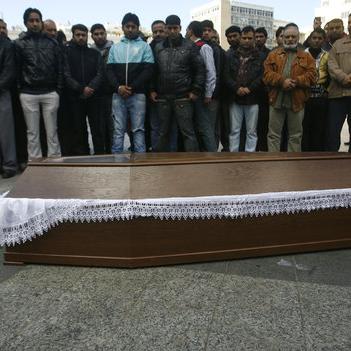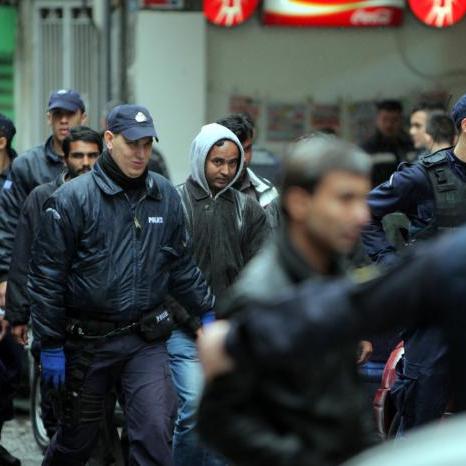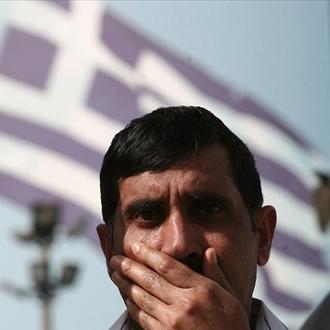The programme which ran from 1/2/2013 to 1/2/2014 sought to document racist violence in Greece as well as the measures to counteract it. It is based on reports from people who sought the assistance of the two organisations and therefore is not a comprehensive study but provides a window onto the worrying levels of racist violence in the country.
According to Kostis Papaioannou, President of the Greek Council for Human Rights and Coordinator of the Network for Recording Incidents of Racist Violence, efforts on the part of the Greek authorities to record incidents of violence and protect the victims are seriously lacking, even following a spate of high profile crimes perpetrated against immigrants and minorities and the crackdown on the neo-Nazi party Golden Dawn.
A full pdf of the report in Greek is available here.
75 recorded cases of racially motivated crimes
MDM and the GCR together recorded 75 acts of racist violence, although it should be noted that this measure does not give the full picture of the phenomenon in the country.
For instance the well-known murderous attack on immigrant strawberry pickers in Manolada in the Peloponnese in April 2013, when a foreman opened fire on 29 Bangladeshi workers after they sought long overdue payments, was counted as one incident.
While the incidence of racist hate-crimes fell immediately following the murder of anti-fascist rapper Pavlos Fyssas by a Golden Dawn member in September, worryingly rates have risen again over the past two months according to the organisations.

The victims
The vast majority of the victims a racist crimes were male, of whom 4 were minors with one victim only 9 years old. Out of 75 victims – not including the Manolada shooting victims – 71 were male and 4 were women.
The majority of victims were from Afghanistan (25) with others from Bangladesh (7), Pakistan (6), Nigeria (5), Iran (5) and a number of other countries. With regards to their legal status 38 of the victims were asylum seekers, 30 did not have documents, 4 were recognised refugees, 2 were receiving supplementary assistance and 1 was a Greek citizen.
The nature of the crimes
The report has details the brutal violence suffered by many of the victims. By and large most of the incidents occurred at night and in all but one case there was more than one attacker. Many victims claimed that their attackers wore black and often wore Nazi symbols. In some cases the perpetrators of violence included teenagers.
The violent gangs would often use weapons including clubs, knives, bottles and pepper spray, while there even reports of aggressive dogs being used to terrorise victims. It is also worth noting that in many cases prior to beating their victims the attackers would first demand to see their papers.
Perhaps most concerning of all is that four racist attacks were alleged to have taken place in police stations. In one such report a 29-year-old Moroccan woman alleged she was savagely beaten by police and violently removed from a police station when she attempted to take a bag of food to her husband who was being held in custod,. Following the intervention of the MdM and the GCR, the woman has been granted refugee status and legal proceedings against the officers involved are underway.

Questionnaires of Shame
In addition to recording racist hate-crimes both MdM and the GCR issued questionnaires to immigrants and asylum seekers who sought their assistance. The results of these further demonstrate the extent of racist abuse in the country. Well over 50% of those asked said that they had encountered racist behaviour in the country and had changed their behaviours out of fear of a racist attack. Furthermore when asked if they had encountered racist treatment at the hands of Greek Authorities well over half of the respondents responded that they had.

Wider society is complicit in acts of racist violence
The report highlights a number of failings on the part of the authorities to counteract incidents of racist violence. Police often simply ignore racist motivations for crimes when they are reported, failing to record them as hate-crimes. Immigrants without the correct documentation are also prevented from pressing charges against their attackers, while others are often intimidated into dropping their cases before they come to trial.
It is no secret that the Greek state demonstrates multiple and egregious failings when it comes to combating racist hate-crimes, generally maintaining a shameful stance somewhere between utter indifference and complicity that in no way is befitting of a supposedly modern democracy.
Yet wider society also plays a role. “What stands out as the most worrying is that the rhetoric of hate and racist practices are now part of daily life,” said Anna Mailly president of the MdM in Greece. “However a society which tolerates as part of its daily life racist criminality is responsible and complicit for what is occurring.”
Which is why that is is the responsibility of each citizen, and not just the government, to say ‘enough,’ and no longer allow hate-filled racist brutes – not to mention a police force that often forgets its purpose – to continue to dishonour the country.